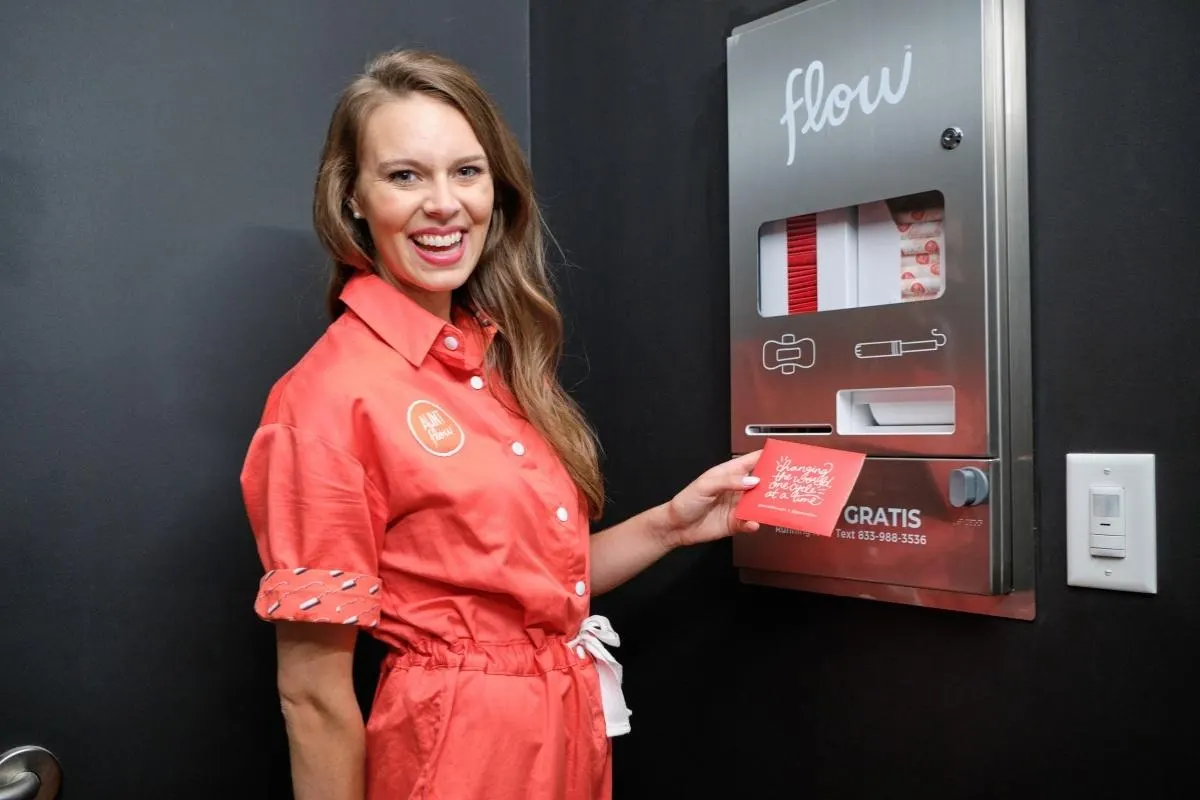By Contributor,Geri Stengel
Copyright forbes

Claire Coder, founder and CEO at Aunt Flow, in front of dispenser of period pads and tampons.
Aunt Flow is a company that partners with schools, businesses, and public venues to stock bathrooms with free pads and tampons, making period products as accessible as toilet paper.
Once seen as a fringe issue, menstrual equity—the idea that access to free period products is a fundamental right—has moved into the mainstream. Since 2016, more and more states and countries have started making pads and tampons free in schools, prisons, and other public places. Companies and sports stadiums are jumping on board as well. They get that providing free period products isn’t just about convenience—it shows they actually care about treating people fairly and with basic dignity.
Leading the charge is Claire Coder, founder and CEO of Aunt Flow and Forbes 30 Under 30 – Social Entrepreneurs (2020), who started the company at 18 after realizing bathrooms outside the home weren’t designed for people with periods. “We first had to create a market, then build a product, then sell the product,” she describes. Today, Aunt Flow’s dispensers are in more than 60,000 bathrooms—from schools and stadiums to Google and airports—symbolizing a cultural shift toward true menstrual equity.
The Rise Of The Free Period Products Movement
Back in 2016, few people had even heard the phrase “menstrual equity.” That changed when New York City passed a groundbreaking law requiring free pads and tampons in schools, shelters, and correctional facilities—a local move that ignited a national push to make period products available to everyone who needs them.
Today, 27 U.S. states and Washington, D.C., require schools to provide free menstrual hygiene products, including pads and tampons. These policies aim to keep students in school and make sure no one misses class because they can’t get the products they need. Scotland has gone a step further, offering free period products to everyone, while New Zealand and France provide them in schools and on college campuses. Since then providing free period products has expanded into workplaces, airports, and sports venues.
MORE FOR YOU
For Coder, the problem was obvious, but trying to fix it at 18 turned out to be incredibly difficult. “Nobody was thinking about how to make commercial bathrooms better for people who get their periods!” she said.
Building A Business Around Free Period Products
Coder’s idea was simple but revolutionary: why shouldn’t public restrooms stock pads and tampons for free, just like they do with toilet paper? The real challenge wasn’t coming up with the concept—it was getting people to see that period products deserved a place in both budgets and bathrooms.
As a teenage founder with no business background, she entered a market that didn’t yet exist. “If I had gone to business school,” she jokes, “it might have occurred to me that I should build a company that had a market for it.” Investors were unsure about her idea, and facilities managers often dismissed it as unnecessary or impractical.
“When you’re young and pitching a product about periods to rooms full of older men, you quickly realize how uncomfortable people are with this topic,” she says. Early on, many buyers didn’t see the point. Coder wasn’t just trying to sell a dispenser—she was trying to normalize a taboo conversation.
Progress was made when grassroots advocacy began to change laws. Nonprofits like the Policy Project in Utah and Justice Necessary in Colorado have fought for bipartisan legislation requiring schools to provide free period products. Aunt Flow cheered those efforts on and, once policies passed, supplied the infrastructure needed to make them work.
When schools and organizations were ready to act, Aunt Flow had a solution: free-vend dispensers stocked with organic cotton pads and tampons, designed to be easy to maintain and resistant to vandalism. What started as a one-woman startup has grown into a company providing menstrual care to millions.
“It makes you feel like your company cares about you and impacts your well-being,” said Meghan Sullivan, Global Marketing Customer Programs lead at Google Workspace Marketing.
Airports have joined the movement. “We are proud to team up with Aunt Flow to bring this groundbreaking solution to airport guests, setting a new standard in the airport experience,” said Liliana Rambo, chief terminal officer for Houston Airports. “We’re prioritizing our guests’ needs, ensuring they have convenient access to essential amenities whenever they need them, making their travel experience smoother and more comfortable.”
Sports teams are also on board. “Our purpose at the Cleveland Guardians is to create a compelling fan experience,” said Rosalie Morrison, the team’s assistant facility director. “Having the ability to cater to a fan’s need, perhaps even in an emergency, free of charge, lets our fans know that we care.”
Menstrual Equity, One Bathroom At A Time
Since 2016, what began as a small advocacy effort has evolved into a mainstream expectation: bathrooms should offer free period products just like soap and paper towels. Schools and public agencies led the way, but now private companies are recognizing that menstrual equity improves employee well-being and brand reputation.
Coder’s entrepreneurial path wasn’t easy. In the company’s early years, she bootstrapped operations, packed boxes herself, and faced rejection after rejection. “I didn’t actually think that I was going to have to go on a decade-long advocacy adventure,” she sighs. “We can’t take credit for all of the policies that have passed, but we’re proud to have collaborated with some nonprofits that fought for accessible period care.”
Aunt Flow’s sanitary disposal system for period products.
Aunt Flow is a company that partners with schools, businesses, and public venues to stock bathrooms with free pads and tampons, making period products as accessible as toilet paper.
In 2024, Aunt Flow broadened what they do by creating a sanitary disposal system for bathrooms. This helps cut down on people flushing period products and makes things safer for janitors and bathroom users by reducing contact with blood borne pathogens.
The global market for sanitary napkin and tampon vending machines, valued at $1.2 billion in 2023, is forecast to grow to $3.4 billion by 2032. Reflecting how menstrual care has become part of a larger conversation about health, gender equity, and sustainability, Aunt Flow has raised more than $17 million in venture capital. In addition, the company has donated over six million tampons and pads and installed its dispensers in bathrooms at universities, as well as major league stadiums.
As more institutions adopt menstrual equity, bathrooms are being reimagined as inclusive spaces that recognize genuine human needs. The message is simple: Everyone deserves access to basic hygiene.
The Next Chapter Of Free Period Products And Menstrual Equity
What’s next for menstrual equity is making sure everyone has access to free period products—not just kids at certain schools or employees at progressive companies. Plenty of states still don’t have any policies, and even where they do exist, poorer districts often struggle to actually follow through. But the momentum is clearly building.
Aunt Flow and other advocates envision a world where no one has to worry about finding a pad or tampon when they need one. “Our mission,” Coder says, “is to make the world better for people with periods.”
That mission, once radical, is now reshaping restrooms across America. What started as one young woman’s idea in 2016 has become a global movement—and increasingly, the new standard for what it means to care for people everywhere. As access to free period products expands and menstrual equity becomes a shared priority, society is taking another step toward dignity, inclusion, and equality for all.
Editorial StandardsReprints & Permissions



